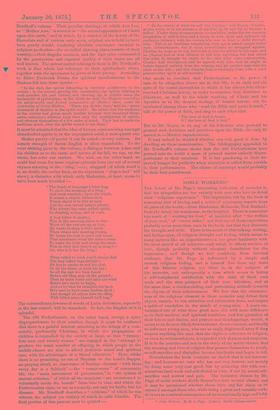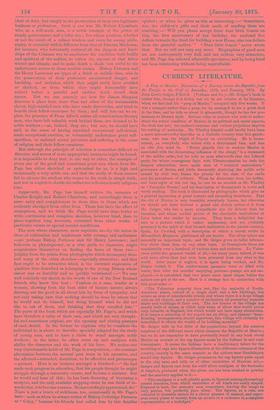NOBLE WORKERS.*
THE defect of Mr. Page's interesting collection of memoirs is, that his sympathies are too entirely with men who love to detail their " religious experience." The impression left by the book is somewhat that of having read a series of missionary reports from all parts of the world,—from Ilindostan, Melanesia, New Zealand ; from the Army, the warehouse, or the hospital. There is somewhat too much of "working for God," of inquiries after "the welfare of your soul," of "sweet talks ;" not that any of these expressions probably occur more than once in the book, but that they illustrate the thought and style. There is too much of that talking, writing, and laying-open, of religious thought and feeling, which seems to many, natures like an impertinence—a too great familiarity with the most sacred of all subjects—and which to others savours of cant, though probably without adequate foundation for the impression ;. and though we feel confident, from internal evidence, that Mr. Page is influenced by a simple and earnest religious feeling, and is himself free from any trace of this falsetto religion, yet there is, in the subjects of his memoirs, not unfrequently a tone which seems to betray a self-complacent satisfaction with the state of their own souls and the sure prospect of their own salvation, and at the same time, a condescending and patronising attitude towards the objects of their solicitousness. We fear that the obtrusive- ness of the religious element in these memoirs may defeat their object, namely, to win attention and admiration from, and inspire a spirit of emulation in, the minds of young men. A more un- varnished tale of what these good men did, with more diffidence as to their motives and spiritual condition, and less quotation of their letters and diaries, and prayers and thanksgivings, would, it seems to us, be more likely first to attract, then to interest, and finally to influence young men, who are so easily frightened away if they suspect anything like cant, that the slightest reference to religion, or even to serious subjects, is regarded with shyness and suspicion. It is in the practice and not in the study of the active virtues, that the meaning and love of religion first present themselves to youth, as self-sacrifice and discipline become inevitable and begin to tell.
Nevertheless the book contains no sketch that is not interest- ing; and honours no man who has not won honour, not merely by doing some very real good, but by achieving this with con- scientious hard work and self-denial at least, if not by actual self- sacrifice and sorrow and pain. The instances chosen by Mr. Page of noble workers divide themselves into several classes, and it may be questioned whether those have any fair claim to be counted amongst them who, while doing a great and valuable work, do it not as a natural consequence of an exceptionally high and lofty
• • Noble Irorkers. By H. A. Page. London: Daldy, 11;biater and Co.
ideal of duty, but simply in the prosecution of their own legitimate business or profession. Such a one was Mr. Robert Chambers, who, as a self-made man, is a noble example of the power of steady perseverance and a lofty aim ; but whose position, whether or not the result of a calmer wisdom and more far-seeing philo- sophy, is certainly widely different from that of Duncan Matheson, for instance, who voluntarily endured all the dangers and hard- ships of the Crimean war to ameliorate the condition both bodily and spiritual of the soldier, to soften the rigours of that bitter winter and climate, and to make death a shade less awful to the unfortunate actors in those terrible scenes. Bishop Patteson and Sir Henry Lawrence are types of a third or middle class, who in the prosecution of their profession encountered danger, and hardship, and isolation which they might easily have avoided or shirked, or from which they might honourably have retired before a painful and sudden death closed their career. But we can scarcely see how Sir James Simpson deserves a place here, more than any other of the innumerable clever, high-minded men who have made discoveries, and tried to benefit their fellow-creatures by them ; and still less can we ex- plain the presence of Dean Alford, unless all conscientious literary men, who have left valuable work behind them, are deemed to be noble workers ;—as, indeed, they are ; but not, we should have said, in the sense of having exercised exceptional self-denial, made exceptional exertion, or voluntarily undertaken great self- sacrifices, or endured severe privation and suffering in the cause of religion and their fellow-creatures.
But although the principle of selection is somewhat difficult to discover, and scores of more appropriate instances might be found, it is impossible to deny that, in one way or other, the example of every one of the good and sometimes great men whose lives Mr. Page has either sketched or epitomised for us, is a high and occasionally a very noble one, and that the study of them cannot fail to elevate the student who comes to the work in simple faith, and not in a spirit to deride the rather too self-consciously religious tone.
Apparently, Mr. Page has himself written the memoirs of Charles Knight and Robert Chambers, and accordingly there is more unity and completeness in these than in those which are evidently abridged from other lives. These last have the effect of scrappiness, and we think Mr. Page would have done better to write continuous and complete sketches, however brief, than to piece-together long accounts, extracted from other works, of particular events or special mental conditions.
The men whose characters most captivate us—by the union in them of cultivation and tenderness with courage and endurance —are perhaps Bishop Patteson and Sir Henry Lawrence ; and believers in physiognomy, as a true guide to character, might congratulate themselves on finding the faces of these two— judging from the prints from photographs which accompany these and many of the other sketches—especially attractive ; and that face ought to be attractive which is the outward expression of qualities thus described as belonging to the young Bishop whose career was so horribly and so quickly terminated :—" We may well conclude our sketch in the words of one of the New Zealand friends who knew him best : Fearless as a man, tender as a woman, showing both the best sides of human nature, always drawing out the good in all about him by force of sympathy, and not only taking care that nothing should be done by others that he would not do himself, but doing himself what he did not like to ask of them, and thinking that they excelled him." 'The parts of the book which are especially Mr. Page's, and which have therefore a value of their own, and which are very thought- ful and sometimes original, are the opening and closing passages of each sketch. In the former he explains why he considers the individual he is about to describe specially adapted for the study of young men, and to have a claim to stand amongst noble workers ; in the latter, he often sums up and analyses with ability the character and the work of his hero. We notice one very objectionable habit of Mr. Page in composition,—the constant alternation between the natural past tense in his narrative, and the affected—intended, doubtless, to be effective and picturesque —present. Here is an instance amongst a hundred :—" He had made such progress in education, that his people thought he might struggle through a university course, and become a minister. But he would not hear of this ; he has been dreaming of becoming a sculptor, and the only available stepping-stone he can think of to- wards that, is to become a mason. He is accordingly apprenticed, &c." There is just a touch of sickliness, too, occasionally in Mr. Page's taste; such as when he always writes of Bishop Coleridge Patteson as " Coley," because his friends had called him by this familiar epithet ; or when he gives us this as interesting :—" Sometimes,. too, the children's gifts and their mode of sending them are touching Will you please accept from dear little Gracie on this, the first anniversary of her birthday, the enclosed five dollars towards the fund for building a new Home, also ten dollars from the grateful mother.' " " Dear little Gracie " never wrote that. But we will not carp any more. Biographies of good men are not unfrequently very dull, and are seldom very attractive, and Mr. Page has selected admirable specimens, and by being brief has been interesting without being unprofitable.



































 Previous page
Previous page